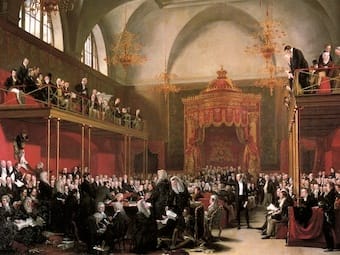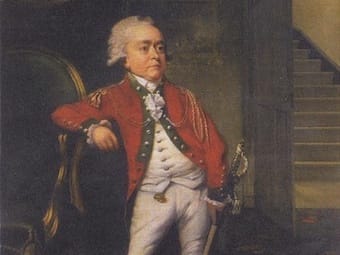Durham Cathedral, photographed from Prebends Bridge over the River Wear. Off to the right, up in the trees, was Callamanco House, later Banks House, where Joseph lived in retirement at the invitation of the unmarried daughters of the cathedral organist, his friend Thomas Ebdon. Joseph had nothing but praise for the benevolence of the Dean and Chapter, “a body distinguished for their munificence, employing their revenue chiefly in the practice of good actions, and in repairing the Cathedral, or their splendid houses ... with a view to circulate money among the poor working people; expending also large sums in subscription to hospitals, and in other public undertakings for the good of the nation: all which expenses occupy much of their revenues.”
HIS lady, who found silence a very grievous penance, here observed, “My dear, this very same lieutenant is now a prisoner in Durham gaol for debt.” A respectable clergyman, the Rev. W. Baverstock, who was present in the company, on hearing this, was so much surprised, and his feelings were so much affected, that he went to inquire whether he deserved assistance, and if it should be found he did, to set him at liberty. He found, to his satisfaction, that this gentleman had contracted his debts merely from his desire to maintain a respectable appearance as an officer, and not, as we often find is the case, from dissipated conduct.
The worthy Baverstock then endeavoured to deliver him from his captivity, but in vain; as he found that he could not, at the lowest estimation, supply from his own income the demand of the creditors. He went without delay to that amiable man, the Rev. R. G. Bouyer, and explained to him all the particulars concerning this unfortunate officer. Mr Bouyer immediately took him under his protection, and engaged that he should be relieved from his distressful situation.
Abridged
Questions for Critics
1. What is the author aiming to achieve in writing this?
2. Note any words, devices or turns of phrase that strike you. How do they help the author communicate his ideas more effectively?
3. What impression does this passage make on you? How might you put that impression into words?
Based on The English Critic (1939) by NL Clay, drawing on The New Criticism: A Lecture Delivered at Columbia University, March 9, 1910, by J. E. Spingarn, Professor of Comparative Literature in Columbia University, USA.
Précis
The veteran captain’s wife again interrupted his flow, this time to remark that the hero lieutenant was now in Durham gaol for debt. This intelligence so upset the Revd Mr Baverstock that he sought out the lieutenant and, after establishing his bona fides, paid off his debts, though the amount was so high that it required help from a friend. (60 / 60 words)
The veteran captain’s wife again interrupted his flow, this time to remark that the hero lieutenant was now in Durham gaol for debt. This intelligence so upset the Revd Mr Baverstock that he sought out the lieutenant and, after establishing his bona fides, paid off his debts, though the amount was so high that it required help from a friend.
Variations: 1.increase the length of this precis to exactly 65 words. 2.reduce the length of this precis to exactly 55 words. 3.introduce one of the following words into the precis: about, because, besides, not, since, whereas, whether, who.
Archive
Word Games
Spinners Find in Think and Speak
For each group of words, compose a sentence that uses all three. You can use any form of the word: for example, cat → cats, go → went, or quick → quickly, though neigh → neighbour is stretching it a bit.
This exercise uses words found in the accompanying passage.
1 Auditor. Own. Surprise.
2 Vain. Wind. Without.
3 Captivity. Dissipate. Particular.
Variations: 1. include direct and indirect speech 2. include one or more of these words: although, because, despite, either/or, if, unless, until, when, whether, which, who 3. use negatives (not, isn’t, neither/nor, never, nobody etc.)
Homophones Find in Think and Speak
In each group below, you will find words that sound the same, but differ in spelling and also in meaning. Compose your own sentences to bring out the differences between them.
This exercise uses words found in the accompanying passage.
Homonyms Find in Think and Speak
Each of the words below has more than one possible meaning. Compose your own sentences to show what those different meanings are.
This exercise uses words found in the accompanying passage.
1. Found. 2. Even. 3. Last. 4. Set. 5. Own. 6. May. 7. Let. 8. Present. 9. Man.
High Tiles Find in Think and Speak
Make words (three letters or more) from the seven letters showing below, using any letter once only. Each letter carries a score. What is the highest-scoring word you can make?
Your Words ()
Post Box : Ask Nicholas
Grok : Ask Grok
You are welcome to share your creativity with me, or ask for help with any of the exercises on Clay Lane. Write to me at this address:
See more at Post Box.
If you like what I’m doing here on Clay Lane, from time to time you could buy me a coffee.
Buy Me a Coffee is a crowdfunding website, used by over a million people. It is designed to help content creators like me make a living from their work. ‘Buy Me a Coffee’ prides itself on its security, and there is no need to register.
Related Posts
Frederick Ponsonby’s involvement in the Battle of Waterloo began early, and it seemed to him that it went on for ever.
Picture: By Walter Holmes Sullivan (1836-1908), via Wikimedia Commons. Licence: Public domain.. Source.
Posted July 9 2021
When King George IV tried to divorce Queen Caroline with maximum embarrassment, her barrister warned that two could play at that game.
Picture: By George Hayter (1792–1871), via Wikimedia Commons. Licence: Public domain.. Source.
Posted June 20 2021
William Burdon gives us a character sketch of his friend the ‘Count’, who did not let his small stature cramp his style or narrow his mind.
Picture: By Philip Reinagle (1748-1833), via Wikimedia Commons. Licence: Public domain.. Source.
Posted March 2 2021






